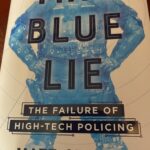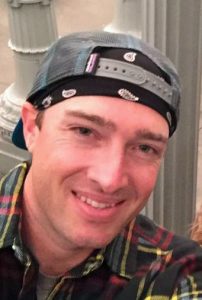by Dave Waddell
news analysis posted Oct. 29
The pain of the taser was “searing … like a baseball bat swung hard and squarely into the small of your back. That sensation, which is actually two sharp steel barbs piercing your skin and shooting electricity into your central nervous system, is followed by the harshest, most violent spasm you can imagine coursing through your entire body.” – Journalist Matt Stroud in his book “Thin Blue Lie.”
SACRAMENTO — Three years ago, the New York Times published a deeply reported story on how paid experts help exonerate police in killing cases. This month, that “cottage industry of exoneration,” including one expert who has made a fortune minimizing the dangers of tasers, operated at full gear on the 15th floor of the Robert T. Matsui Federal Courthouse.

Several experts with long and lucrative ties to that exoneration industry testified in support of Chico police in a civil suit brought by the parents of Tyler Rushing. After an eight-day trial in the U.S. District Court for the Eastern District of California, an eight-person jury decided Oct. 17 that officer Alex Fliehr did not use excessive force when he tased the thrice-shot, motionless Rushing in 2017.
Chico Police Chief Billy Aldridge declined to comment on the verdict. The City recently released — under pressure of a court order — this PowerPoint analysis of Rushing’s killing.
The N.Y. Times story reported that critics of the exoneration consultants accuse them of “slanting science, ignoring inconvenient facts and dangerously emboldening police officers to act aggressively.”
Multiple experts testifying at the Rushing trial have deep ties to Force Science Institute, which has promoted some dubious research conclusions, according to Seth Stoughton, an ex-cop, professor of law at the University of South Carolina, and one of the nation’s foremost experts on police uses of force.
“Force Science research is not very highly regarded by most traditional academic researchers,” Stoughton said in 2021 while discussing the Chico police killing of Stephen Vest. “It is very well regarded with police … because it almost always works to the benefit of the officers.”

Tyler Rushing
Even though Chico PD policy describes the pain from a taser stun gun as “intense,” a softer phrase was oft repeated by police at the Rushing trial: “momentary discomfort.” Chico officer Jeremy Gagnebin, who observed Rushing’s tasing, testified to being tased before he became a cop, claiming the pain was not that big of a deal.
“It essentially immobilizes you,” Gagnebin told the court. “Will lock up all of your muscles. … I would not say that it’s a pain. I will just say it’s uncomfortable. … Five seconds of just being uncomfortable and not being able to move.”
Stoughton, the police practices expert, said Gagnebin is wrong — as a matter of law.
“(Tasers) are quite painful,” Stoughton said. “The electrical discharge is intensely painful and typically causes burn-like pain and swelling at the point of contact, in addition to the puncture injuries from the barbed darts.”
The U.S. Court of Appeals for the Fourth Circuit has determined that a taser “inflicts a painful and frightening blow” and causes “excruciating pain,” said Stoughton, adding that other circuit courts have made similar statements.
In his 2019 book “Thin Blue Lie: The Failure of High-Tech Policing,” journalist Matt Stroud described his tasing as a sensation of “Needles everywhere, overwhelming you. … You lose control of almost everything and the only place you can go is down, face first to the floor. The whole thing lasted five seconds – but it felt like an eternity.”
“Taking a ride”
But jurors at the Rushing trial got a very different story from officers Gagnebin, Fliehr and Cedric Schwyzer, as well as from expert defense witness Mark Kroll. In his testimony, Kroll, who has a Ph.D. in electrical engineering but is not a medical doctor, continually minimized the pain of a taser.

In 2021, Stoughton testified as an expert witness for the prosecution at the trial of Derek Chauvin, George Floyd’s murderer. Kroll did not testify at the Chauvin trial, but Kroll’s research was cited by a defense witness “as proof that putting body weight on someone facedown does not cause asphyxia,” according to the N.Y. Times story.
Kroll testifies frequently. In fact, in his Rushing case testimony, he blurted out that Tyler had been under the influence of methamphetamine when tased. The falsehood brought his testimony briefly to a halt, with the judge telling the jury Kroll was “totally mistaken.” Kroll apologized, saying he mixed up his cases.
Clad in bow tie, Kroll turned chatty with the jury at times, claiming that muscle stimulators “to get your six-pack going” deliver more electrical current than tasers.
“You really feel that,” Kroll said of the stimulators. “I’ve tried them. I don’t like them at all.”
One of the Rushings’ attorneys, Robert Chalfant, pressed Kroll on his ties to Axon Enterprise Inc., the company that provides ever-evolving models of tasers and body-worn cameras to law enforcement agencies. Kroll previously headed up Axon’s scientific and medical advisory board.
Chalfant: And am I correct that for that job you were paid approximately $267,000 per year from Axon?
Kroll: I’ll take your word for it. I’m sure you’re reading off the printout.
Chalfant: Is it true you currently own $1 million worth of Axon stock?
Kroll: It’s probably more than that. … When I first started advising them … they paid me in stock, and since then it’s become extremely valuable … It was a windfall, but I don’t think I need to apologize for it …
It wasn’t Kroll’s first such windfall, according to Stroud’s book.
In 2004, after “elbowing” his way to becoming Axon’s top science adviser, Kroll made about $2.8 million from the company’s stock, Stroud reported. Indeed, it was Kroll’s credentials and research that Axon has used for decades to downplay taser dangers, his critics contend.
When interviewed by investigators after the Rushing tasing, Fliehr described his taser shot as giving Rushing “a ride.” In his closing argument to the jury, plaintiff’s attorney Mark Merin said Fliehr’s “jargon is repulsive.”
It’s also common language promoted at Axon headquarters, where Stroud said he was encouraged “to take a ride,” resulting in the description of his painful experience quoted above.
When tased, Rushing was jolted noticeably from his semi-prone position. That Tyler might have been dead or near-death and not felt the taser’s pain did not lessen the “cruelty” of Fliehr’s act, argued attorney Merin.
Desmond Phillips, who was shot dead by Chico police four months before Rushing’s killing, could first be heard on a 911 call moaning from the lash of a taser. Seconds later, Fliehr and Gagnebin unleashed a barrage of bullets from their Glocks, killing Phillips, a 25-year-old Black man in mental crisis.
Dave Waddell is a contributing writer to ChicoSol who is working on a book about Butte County law enforcement killings.

This should be on 60 minutes. People need to know this.
Yes!
A cop or “expert” that testifies to a jury that tasers are painless and harmless and does not demonstrate it on themselves in front of the jury, has zero credibility. A juror that believes unproven testimony that tasers are painless and harmless should volunteer to be tasered before voting on that belief.
I am heartsick that the testimony making light of the effects of tasing was allowed to stand in that court. Testimony that is not true, should not be allowed in a court of law. It’s not about a difference of opinion -it’s about the reality of what happens to a person’s body when they are tased; what happened to Tyler’s body when he was tased.
With this verdict, police are given license to taze away instead of practicing compassionate de-escalation approaches with people in crisis. For shame!
Police recruiting is the first stop. Police are typically low level intel who follow orders without question to secure a pension. Their Training is inadequate. They are easily politicized by corrupt District Attorneys and BAR associates who are typically alcoholics or drug abusers. The system is Broken because it’s fixed by organized criminals. Some cops are just bully’s with badges, bullets, billy clubs, mace, Tazers.
Kenneth
There is evidence that police departments nationwide have lowered the bar to becoming a cop. The profession is desperate for bodies, ignoring proper screening and preferring quantity to quality. This lowering of the bar is especially true in rural police departments in northern California. Even with substantial signing bonuses and increased salary and benefits, the profession is scraping the bottom of the barrel to hire new cops. Police academies train recruits to kill or be killed, not to communicate, protect, and serve. Until feckless politicians get the guts to legislate changes, the profession will continue to embolden the escalation of violence against civilians.
Thanksgiving is here. The families who lost loved ones to “peace officers” of Butte County will not be able to enjoy the holiday without feeling grief. Some families may set a place at the table that won’t be filled. Many families will say prayers in remembrance of their family member who was killed in an “Officer Involved Shooting,” but only justice will bring solace.
It was 1938 when the last Chico PD officer was killed while on duty. In contrast, the last civilian killed by a Butte County PD “peace officer” occurred on January 2, 2023, and thirty-nine civilians have been killed by “peace officers” during the reign of Butte County District Attorney Michael Lee Ramsey, who exonerated the officers in every killing but one.
Officer-involved fatal shootings in Butte County
Over a decade, there have been 13
April 28, 2014: Victor Ray Coleman, 53 (Oroville PD)
May 18, 2014: Cory Lee Bush, 24 (Butte County Sheriff’s Office)
Nov. 25, 2015: Andrew Thomas, 26 (Paradise PD)
Nov. 10, 2015: Eddie “Gabe” Sanchez, 34 (Chico PD)
March 17, 2017: Desmond Phillips, 25 (Chico PD)
July 23, 2017: Tyler Rushing, 34 (Chico PD)
Aug. 17, 2017: Mark Jensen, 56 (Butte County Sheriff’s Office)
April 7, 2018: Larry Siordia, 33 (Butte County Sheriff’s Office)
April 26, 2018: Myra Micalizio, 56 (Butte County Sheriff’s Office)
Nov. 15, 2018: GD Hendrix, 48 (Butte County Sheriff’s Office)
Jan. 28, 2019: Richard Moulton, 52 (Butte County Sheriff’s Office)
Oct. 14, 2020: Stephen Vest, 30 (Chico PD)
Jan. 2, 2023: Baltazar Rubio, 43 (Gridley PD)
Thank you for this important and tragic information.
Time to make some noise people.
“It essentially immobilizes you,” Gagnebin told the court. “Will lock up all of your muscles. … I would not say that it’s a pain. I will just say it’s uncomfortable. … Five seconds of just being uncomfortable and not being able to move.”
THIS IS A CHALLENGE, Gagnebin & Fliehr. Are you two boys in blue cowards? I challenge you two to have Chief Aldridge standing over you as you lie face down on the floor and give each of you a TASER “ride” on your bare backs, a full two-dart 50,000-volt charge, and live stream it on Facebook. Prove the statements you made in court under oath to the judge and jury were the truth, the whole truth, and nothing but the truth, so help you, God!
This has taken some time to comment,but was certain I wanted to…In following the tremendously disturbing killing of Tyler Rushing, I now find that there was no convictions in this seemingly final court case. I think the one thing that stands out to me with this and other cases I have witnessed in Butte County and the surrounding area of Northern California is that in truth, no one wins.… Neither the young man’s whose life has been ended and in such a violent way, the parents, Scott and Paula, who will never watch their son’s life evolve. The police officers and others involved in his killing, have certainly lost the respect and trust of a community they have said to be protecting. I Was at first, in shock that after so many attempts and ways to make peace and closure as best as possible, at least for Tyler, it will end as a no win situation. We can Only hope for more integrity and justice to prevail, especially in situations like this. Let’s stop killing our children. And remember, we are all someone’s children. Someone’s loved one.
Some people will sell their souls to fatten their wallets. I’d like to ask Mr “expert” Kroll would he want the same brutality that was inflicted upon Tyler Rushing & Desmond Phillips, inflicted upon somebody he loves? The sick thing is this monster would probably tell a jury he’d be perfectly fine with it….after all he makes his bread & butter off the murders of community members. He can’t have anything interrupting the status quo for him or the injustice system. The system is set up to allow police to get away with murder.